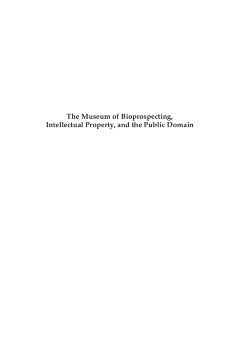
BOOK
The Museum of Bioprospecting, Intellectual Property, and the Public Domain
(2011)
Additional Information
Book Details
Abstract
‘The Museum of Bioprospecting, Intellectual Property, and the Public Domain’ addresses one of the most pressing policy issues of our day: intellectual property rights versus the public domain in facilitating access to genetic resources for biotechnology development. The issue is examined in the context of a proposal submitted by seven fictional scholars to an imaginary octogenarian, whose humor provides an original addition to the discussion.
'The Museum of Bioprospecting, Intellectual Property, and the Public Domain' addresses one of the most heated policy debates of our day: access to genetic resources and the fair and equitable sharing of benefits. Seven scholars – an anthropologist, an economist, a sociologist, and four lawyers – discuss how a museum can flesh out the relevant ethical issues that frustrate any purely technical solution. The visitors to the proposed museum become a source of considered judgments. Commercial movies are screened and discussion follows about some aspect of bioprospecting, intellectual property, and the public domain, suggested in the films. Both the screenings and discussions occur in small amphitheatres named according to the uneven chronology in the management of information: 100,00 BC to 16 September 1787 (public domain); 17 September 1787 to today’s date (intellectual property); and today’s date to (?) (legislation sui generis). The three amphitheatres surround a courtyard café which is a metaphor for the mission of the museum: conversation. The scholars vet the blueprint before an imaginary octogenarian who is not at all impressed and will "say the damnedest things." As this 21st century Don Quixote moseys across the chapters and pokes fun at the scholarly ruminations, the reader begins to understand how the proposed museum is indeed a forum for the nuanced ethics over bioprospecting, intellectual property, and the public domain. The dialogue-within-a-dialogue is highly original and entertaining.
'Out of the self-absorbed world of global genetic resources and benefit-sharing, emerges an immensely invigorating volume. With a stellar cast of contributors, the editor cajoles the reader forward through the literary device of a gadfly interloper. The result is a compelling must-read for practitioners and neophytes alike. Where else would you find between the covers of a scholarly treatise, references to Hegel, the Pope and Cher?' —Timothy Hodges, Co-Chair, Working Group on ABS, UN Convention on Biological Diversity
'…adventurous thinkers from a range of disciplines roaming over some of the great conflicts of our time.' —Jay Parini, author of 'The Last Station' and 'Promised Land: Thirteen Books that Changed America'
'A provocative book about a museum-cum-amusement park-cum-people's forum; just like what prevailed in the pre-mobility, pre-TV culture of a people's gathering to think collectively.' —Ossama El-Tayeb, Professor Emeritus, Faculty of Pharmacy, Cairo University
'This book should be read by everyone with an interest in the theory and practice of biodiversity, intellectual property and equity.' —Graham Dutfield, author of 'Intellectual Property Rights and the Life Science Industries: Past, Present and Future'
Joseph Henry Vogel is professor of economics at the University of Puerto Rico-Río Piedras and has served as a technical advisor to the Ecuadorian delegation to the Conference of the Parties of the Convention on Biological Diversity.
Contributors: María José MORENO VIQUEIRA, Manuel RUIZ, Tomme YOUNG, Stephen B. BRUSH, Charles R. MCMANIS, Valentina DELICH, Camilo GOMIDES, Carlos A. MUÑIZ-OSORIO
